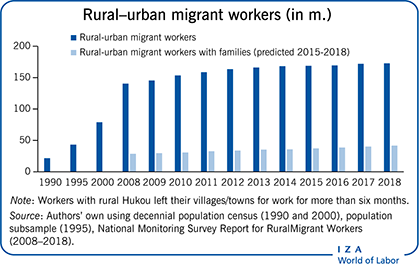Elevator pitch
The difference in educational attainment between China's urban- and rural-born populations has widened in recent years, and the relatively low educational attainment of the rural-born is a significant obstacle to raising labor productivity. Rural-to-urban migration does not create incentives to enroll in higher education as the availability of low-skill employment in urban areas makes remaining in school less attractive. In addition, the child-fostering and urban schooling arrangements for children of migrants further inhibit human capital accumulation.

Key findings
Pros
High returns to middle school education incentivize completion of compulsory education among rural youth.
Remittances from migrants improve health outcomes among children left behind.
If fees charged to migrant children in urban schools are subsidized, parents will bring children to urban areas.
Migrant children who enroll in urban public schools tend to perform better than those in migrant-operated schools.
Reducing the salience of migrant status may improve school performance of migrant children.
Cons
Availability of low-skilled wage employment in urban areas creates a disincentive for rural high school enrollment.
Providing information on the returns to education is not sufficient to induce rural children to enroll in high school.
Parent absence slows down the cognitive and socioemotional development of children left behind.
Lack of access to public schools in urban areas means that migrant children are often enrolled in migrant schools with lower quality education.
Maintaining separate migrant schools is unlikely to bridge performance gaps between migrant and local children.